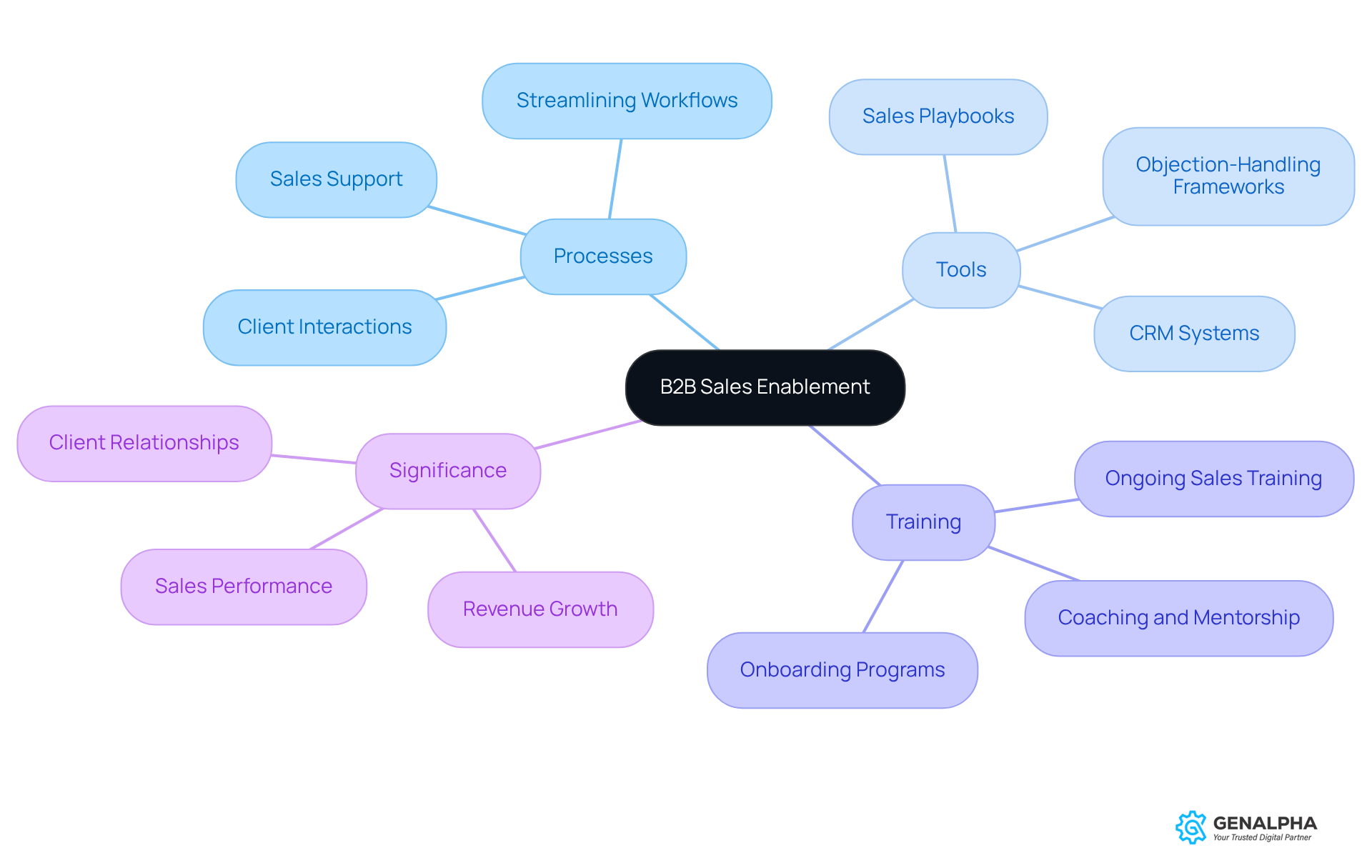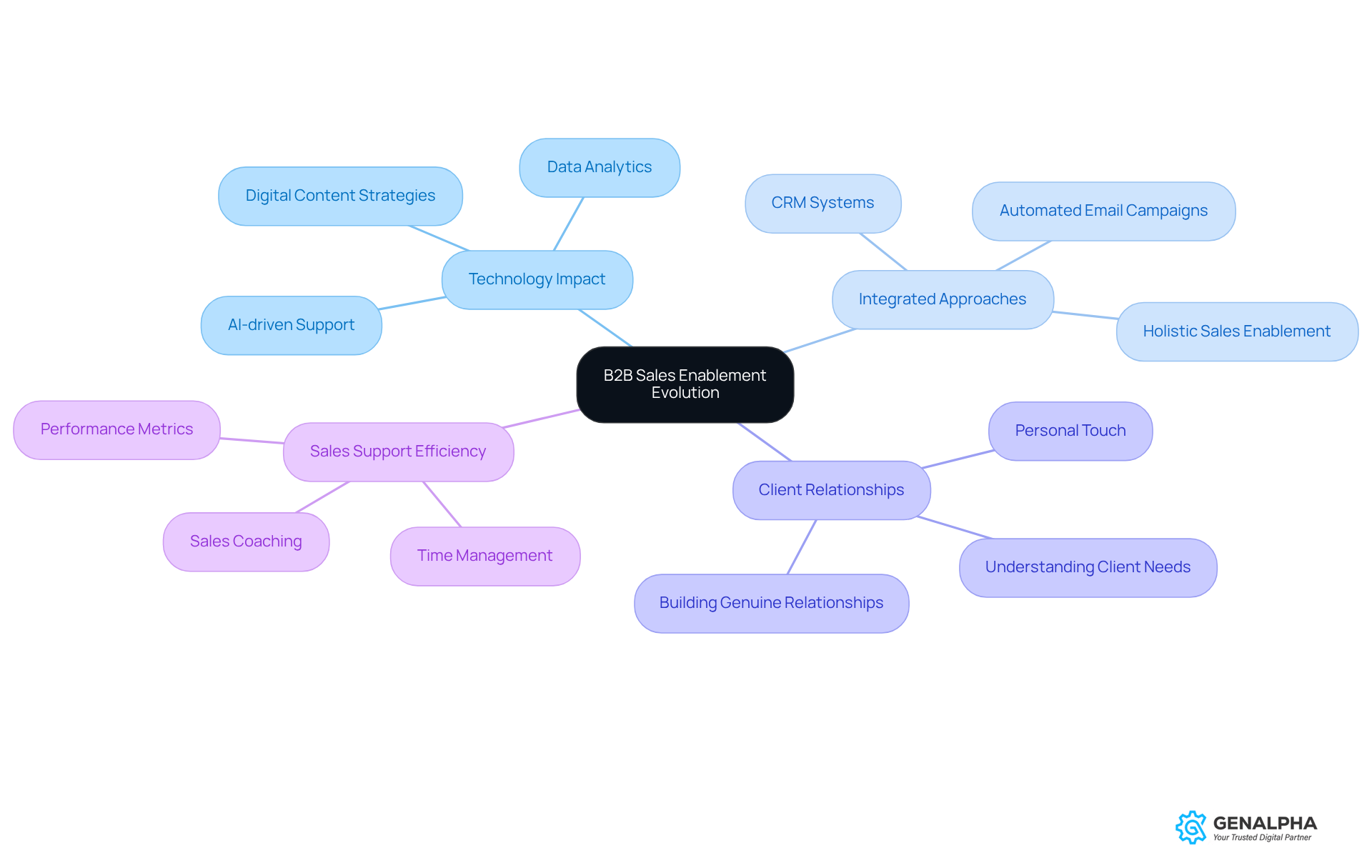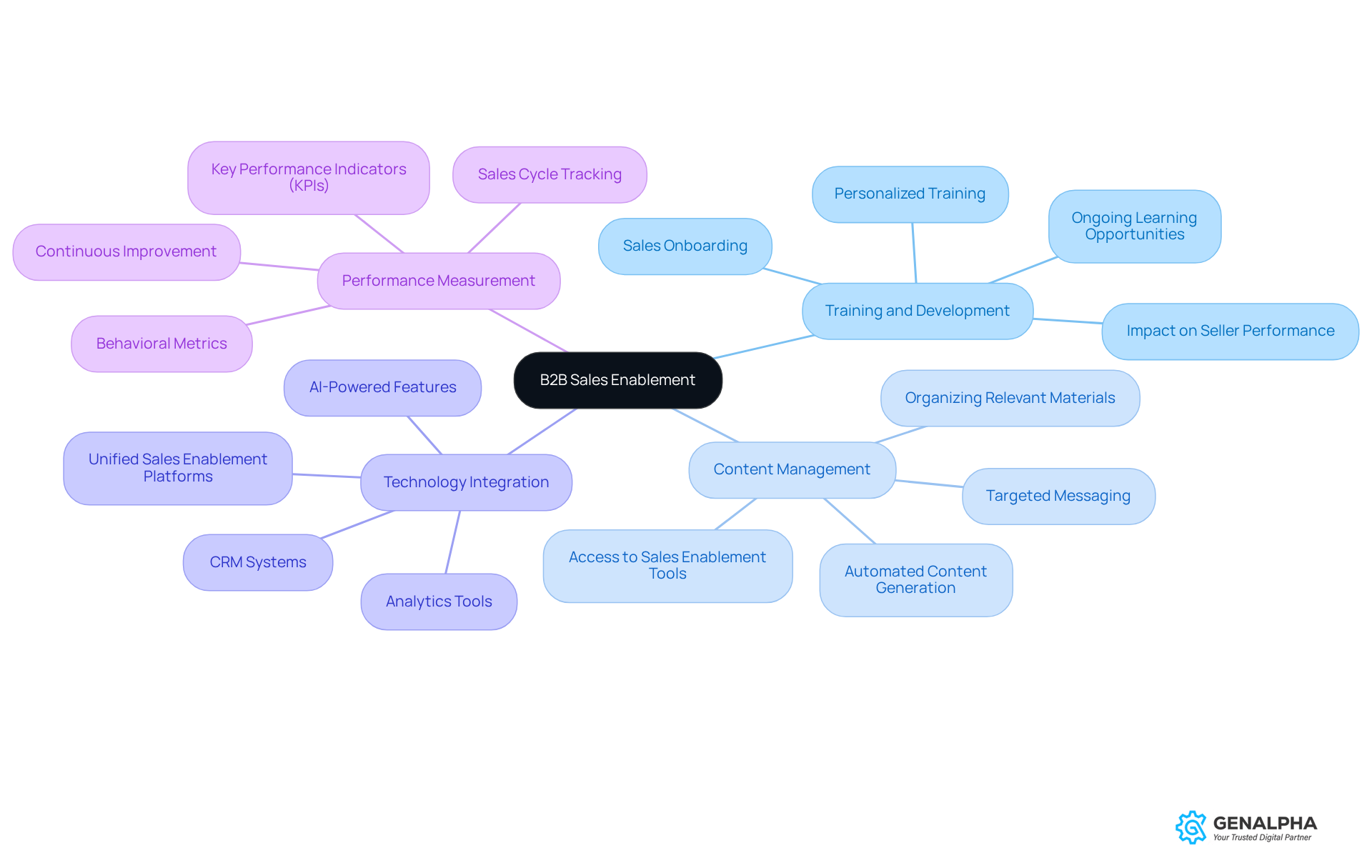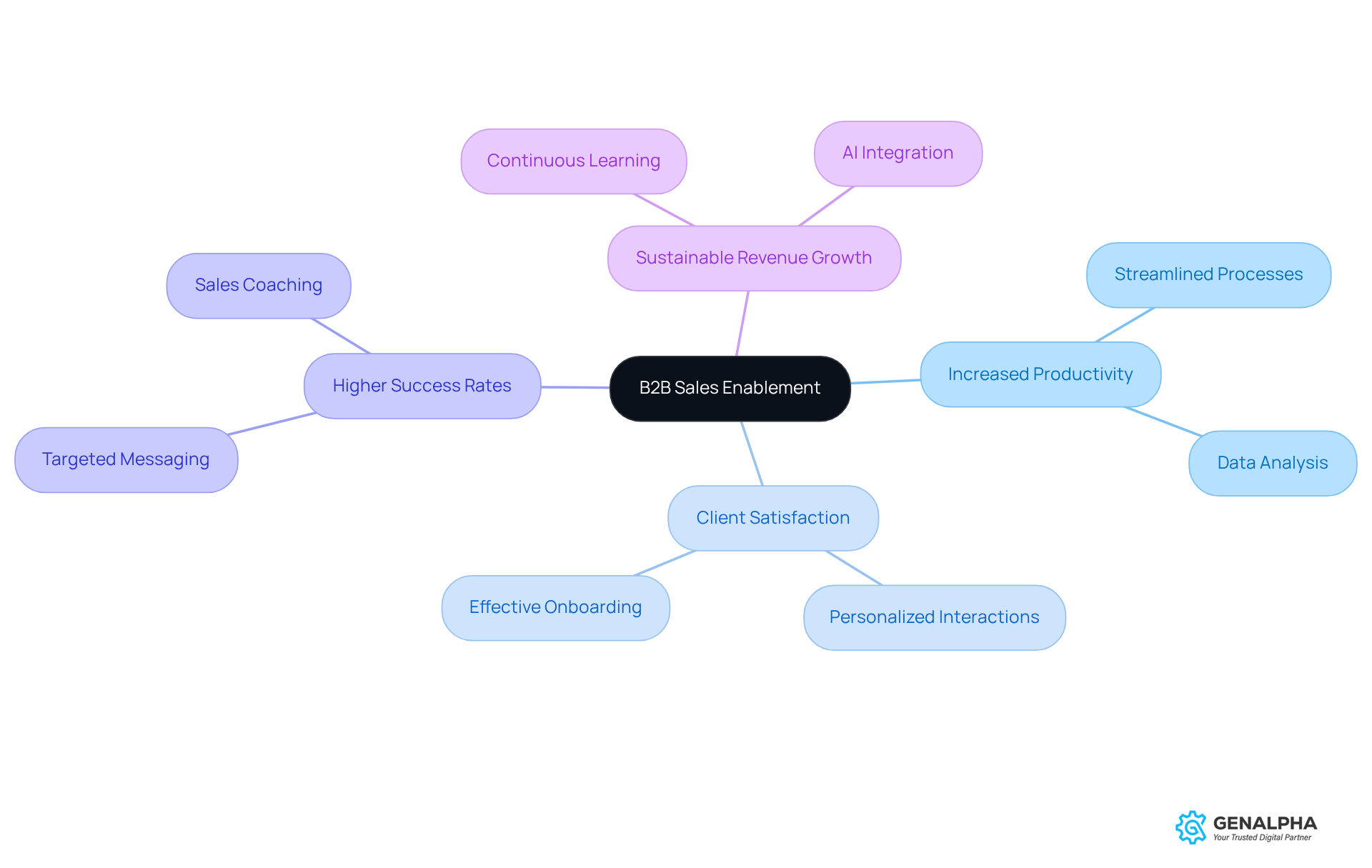Overview
B2B sales enablement is super important for manufacturers. It gives them the processes, tools, and resources they need to really connect with clients and boost revenue growth. Have you ever wondered how some companies seem to thrive while others struggle? Well, the secret often lies in strong sales enablement programs. These companies tend to see significantly higher revenue growth and improved sales performance.
So, what’s the key here? It’s all about training, content management, and technology integration. These elements help navigate the often complex sales environments we face today. By focusing on these areas, manufacturers can not only engage their clients better but also drive their business forward.
Isn’t it exciting to think about the possibilities? Imagine your team equipped with the right tools and knowledge, ready to tackle any challenge. If you’re looking to enhance your sales strategy, consider investing in a robust sales enablement program. It could make all the difference!
Introduction
In the competitive world of manufacturing, connecting with potential clients can truly be the game-changer between success and stagnation. That's where B2B sales enablement comes into play—it's a vital strategy that arms sales teams with the tools, resources, and insights they need to enhance client interactions and boost revenue growth. But as the industry rapidly evolves with new technologies and changing consumer expectations, how can manufacturers not just keep up, but actually thrive?
Exploring the key components and impacts of B2B sales enablement can shed light on these pressing questions. It offers a roadmap to improved performance and lasting client relationships. So, let's dive in and discover how we can navigate this landscape together!
Define B2B Sales Enablement and Its Significance
B2B sales enablement focuses on the processes, tools, and resources that help teams connect with potential clients and seal the deal. Think of B2B sales enablement as a strategy that includes training, content creation, and tech integration—all aimed at making the sales journey smoother. Why is this so important? Because B2B sales enablement simplifies the sales process, enhances client interactions, and drives revenue growth.
In an industry like manufacturing, where consumer expectations are shifting rapidly, B2B sales enablement is key to having solid sales support, staying ahead of the competition, and building lasting relationships with clients. Did you know that companies with robust B2B sales enablement programs see a whopping 13.7% more annual revenue growth than those that don’t? Plus, 76% of sales reps believe that B2B sales enablement is essential for helping them hit their targets, highlighting just how crucial it is for boosting sales performance.
By equipping teams with the right tools—like playbooks and frameworks for handling objections—manufacturers can improve their B2B sales enablement and navigate complex selling processes more efficiently. And let’s not forget how B2B sales enablement through sales support speeds up the onboarding process for new reps, allowing them to get productive faster. This not only enhances customer satisfaction but also leads to greater profitability through effective B2B sales enablement. So, how can you leverage sales support to transform your sales strategy today?

Explore the Evolution and Context of B2B Sales Enablement
The landscape of B2B commerce support has changed a lot over the past twenty years. Remember when the focus was mainly on preparing sales reps with basic marketing materials? Well, that’s all shifted! With the rise of digital technology and the internet, buyers are now more informed and discerning than ever. This evolution has led us to rethink how we support B2B sales enablement, moving towards a more integrated approach that brings together data analytics, client relationship management (CRM) systems, and digital content strategies.
Nowadays, effective sales support isn’t just about providing tools; it’s about creating a seamless and engaging customer journey. Did you know that sales representatives spend only about 30% of their time actually selling? That’s a real eye-opener! It highlights the urgent need for efficient sales support methods. Plus, the introduction of AI-driven support agents is revolutionizing B2B sales enablement by transforming how sales teams operate, offering real-time insights and suggestions.
This interconnected approach not only enhances productivity but also strengthens relationships with clients, driving growth in the competitive manufacturing sector. But let’s not forget—while technology is crucial, keeping the human touch in transactions is just as important. It’s all about understanding client needs and building genuine relationships. So, how can we ensure that we’re not losing that personal connection in this tech-driven world?

Identify Key Components and Characteristics of B2B Sales Enablement
When discussing b2b sales enablement, there are a few key elements that really make a difference:
- Training and development
- Content management
- Technology integration
- Performance measurement
Think about it—b2b sales enablement training ensures that sales teams have the skills and knowledge they need to connect with clients effectively. Without that, how can they really engage?
Next up is content management. This involves creating and organizing relevant materials—like case studies, product information, and competitive analysis—that contribute to b2b sales enablement and help drive the marketing process. It's all about having the right tools at your fingertips, right?
Then there's technology integration within the context of b2b sales enablement. This includes CRM systems and analytics tools that facilitate b2b sales enablement by allowing business teams to keep track of customer interactions and refine their strategies. It’s like having a GPS for your business journey!
Finally, we can’t forget about performance evaluation as it is crucial for b2b sales enablement. This is where organizations assess how well their revenue enhancement initiatives are doing and make data-informed improvements. It’s all about learning and growing.
So, how are you leveraging these elements in your own business? Let’s dive into the conversation!

Analyze the Impact of B2B Sales Enablement on Business Performance
Have you ever noticed how B2B sales enablement can really make a difference in business performance? When companies embrace effective sales support strategies, they often see a boost in productivity, happier clients, and higher success rates. For instance, businesses that leverage data analysis to shape their marketing strategies gain valuable insights into what their customers really want. This leads to more personalized interactions that resonate with clients.
Additionally, streamlining processes helps sales teams spend less time on admin tasks. This means they can focus more on building relationships and closing deals. Isn’t that what we all want? Ultimately, adopting B2B sales enablement practices not only improves how efficiently a business runs but also paves the way for sustainable revenue growth and a competitive edge in the market. So, why not explore how these strategies can work for you?

Conclusion
B2B sales enablement is more than just a strategy; it’s a game-changer for manufacturers looking to streamline their sales processes and boost client interactions. By weaving together training, technology, and smart content management, organizations can turn their sales teams into high-performing units ready to tackle the challenges of modern B2B commerce.
Throughout our journey, we've uncovered some key insights. The evolution of B2B sales enablement shows a clear shift from basic sales support to a more holistic approach. This new focus prioritizes data analytics, tech integration, and personalized client engagement. The essential components—training, content management, technology integration, and performance measurement—form the backbone of a successful sales enablement strategy. And the results speak for themselves: companies that embrace these practices see boosts in productivity, client satisfaction, and sustainable revenue growth.
As the manufacturing landscape continues to change, adopting B2B sales enablement isn’t just a nice-to-have; it’s a must. Organizations need to prioritize these strategies to remain competitive and meet the evolving expectations of their clients. By leveraging effective sales enablement practices, manufacturers can enhance operational efficiency and build stronger relationships with their clients, paving the way for long-term success in a rapidly shifting market. So, are you ready to embrace this essential strategy and take your sales to the next level?
Frequently Asked Questions
What is B2B sales enablement?
B2B sales enablement refers to the processes, tools, and resources that assist sales teams in connecting with potential clients and closing deals. It includes strategies such as training, content creation, and technology integration to streamline the sales journey.
Why is B2B sales enablement important?
B2B sales enablement is important because it simplifies the sales process, enhances client interactions, and drives revenue growth. It helps organizations stay competitive and build lasting relationships with clients, particularly in rapidly changing industries like manufacturing.
What are the benefits of having a robust B2B sales enablement program?
Companies with strong B2B sales enablement programs experience 13.7% more annual revenue growth compared to those without. Additionally, 76% of sales representatives believe that B2B sales enablement is essential for achieving their sales targets.
How does B2B sales enablement support sales teams?
B2B sales enablement supports sales teams by providing tools such as playbooks and frameworks for handling objections, improving efficiency in navigating complex selling processes, and speeding up the onboarding process for new sales representatives.
What impact does B2B sales enablement have on customer satisfaction and profitability?
Effective B2B sales enablement enhances customer satisfaction by improving the sales experience, which can lead to greater profitability for the organization.




